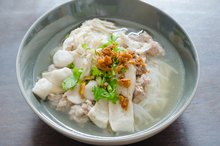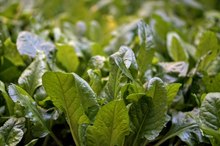Calories in Spinach Pasta
Spinach pasta is a popular addition to many Italian-style dishes. Spinach pasta is low in calories and relatively low in carbohydrates, making it a good alternative to traditional wheat pastas.
Calories
The standard serving size for spinach pasta is 2 oz., according to the United States Department of Agriculture. Each serving of spinach pasta has 74 calories.
Calories from Fat
How Many Calories in Vietnamese Food?
Learn More
One gram of fat has nine calories. Spinach pasta has very little fat. In each 2-oz. serving, it has .5 g of fat, so less than five of its calories are from fat.
Calories from Carbohydrates
Each gram of carbohydrates has four calories. Not surprisingly, the more than 14 g of carbohydrates give a serving of spinach pasta the majority of its calories -- accounting for more than 57 of the total calories.
Calories from Protein
Calories in Veggie Lasagna
Learn More
A single gram of protein also has four calories. Each serving of spinach pasta has nearly 3 g of protein, so almost 12 calories are from protein.
Related Articles
References
Writer Bio
Amanda White has been a freelance ghostwriter since 2003, specializing in writing about medical issues. White has a Bachelor of Science in engineering from The George Washington University with a focus on biomedical engineering.









